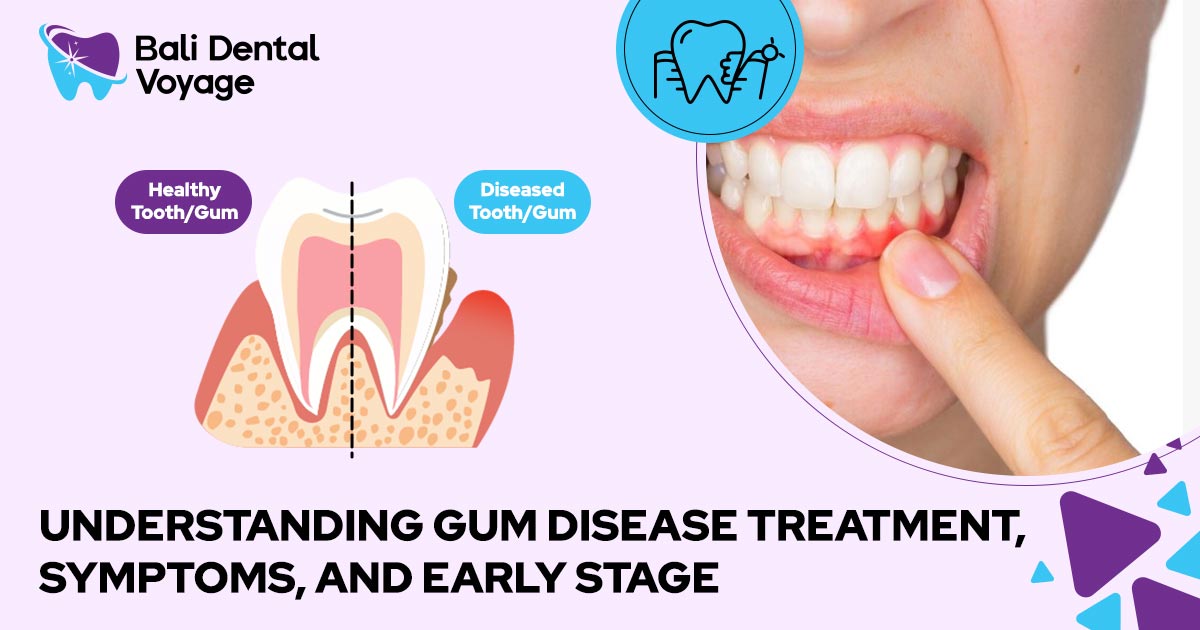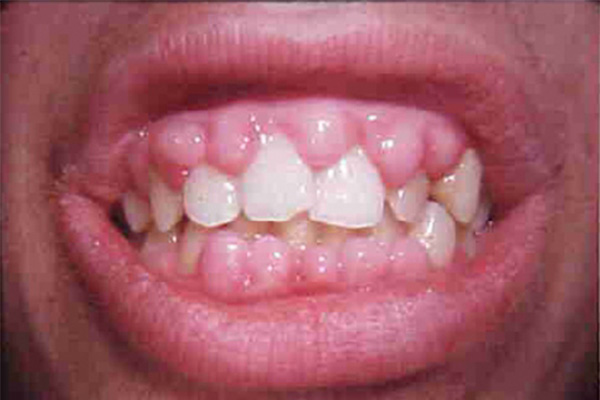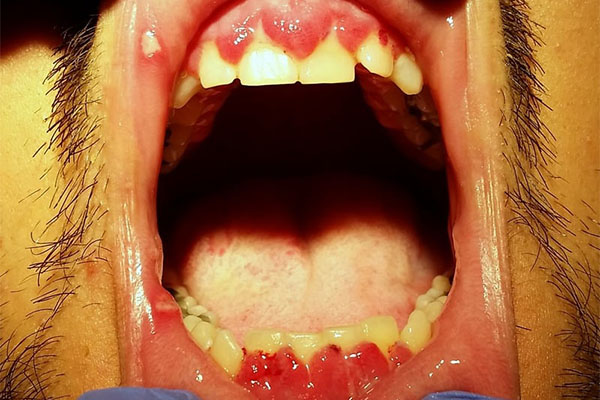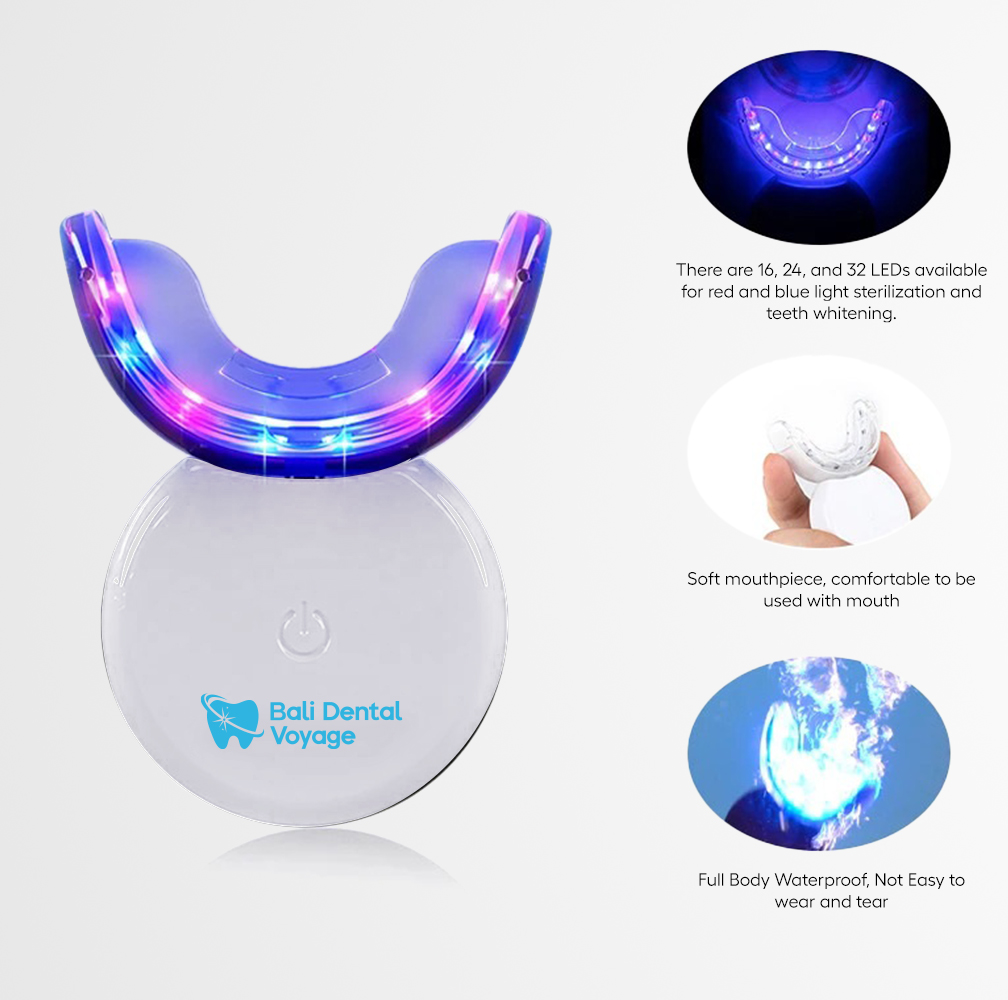
Gum disease, or periodontal disease, is a common dental problem that can have serious consequences if left untreated. It occurs when the tissues and bones that support the teeth become infected and inflamed.
This article will discuss:
- Gum Disease Treatment
- Gum Disease Symptoms
- Early Stage Gum Disease
- What Does Gum Disease Look Like
- Conclusion
By the end, you’ll have the tools to protect your oral health and combat gum disease.
Gum Disease Treatment
Gum disease can wreak havoc on your oral health if left untreated. Fortunately, there are several treatment options available, each designed to address the severity of the condition and improve your overall oral health.
Let’s take a closer look at the most common treatments for gum disease:
- Scaling and Root Planing
This non-surgical treatment removes plaque and tartar buildup from the teeth and gums, significantly reducing inflammation and halting further damage. - Antibiotics
If gum disease is caused by a bacterial infection, antibiotics may be prescribed to treat the condition, reducing inflammation and preventing further damage. - Surgery
In advanced cases of gum disease, surgery may be required to remove damaged tissue and reposition the gums. Your dentist will determine the best course of treatment. - Maintenance
After gum disease has been treated, it’s important to maintain good oral hygiene habits to prevent further damage. Regular dental checkups, brushing twice a day, flossing daily, and using an antibacterial mouthwash can help to ensure your oral health remains in top condition.
By understanding the various treatment options available for gum disease and taking proactive steps to maintain good oral hygiene habits, you can safeguard your oral health and enjoy a healthy smile for years to come.
Gum Disease Symptoms

Gum disease is a common condition that can cause a range of symptoms, with the severity of the symptoms varying depending on the extent of the disease.
Some of the most common symptoms associated with gum disease include:
- Bleeding gums
- Swollen and tender gums
- Receding gums
- Bad breath
- Loose teeth
- Pain when chewing
- Changes in bite
If you are experiencing any of these symptoms, it’s important to see your dentist right away to get an accurate diagnosis and treatment plan. By addressing periodontal disease promptly, you can prevent further damage to your oral health and maintain a healthy smile.
Early Stage Gum Disease
Gingivitis is an early stage of periodontal disease caused by plaque and tartar buildup on teeth and gums. It’s reversible with proper treatment and oral hygiene habits. Here’s what you need to know:
What Causes Gingivitis
Plaque, a sticky film containing bacteria, is the primary cause of gingivitis. If left untreated, it can progress to more severe periodontal disease. Tartar, a hardened form of plaque, can only be removed by a dental professional.
Prevent Gingivitis
Practising good oral hygiene habits such as brushing twice a day, flossing daily, and using an antibacterial mouthwash can help prevent gingivitis. Regular dental checkups and cleanings are also crucial to removing plaque and tartar buildup.
Gingivitis Treatment
Seeking treatment as soon as possible is key to treating gingivitis. Treatment involves removing plaque and tartar through scaling and root planing and regular dental cleanings.
Antibacterial mouthwash may also be recommended. By following these treatment options, you can reverse the effects of gingivitis and maintain healthy gums and teeth.
What Does Gum Disease Look Like

Periodontal disease can manifest in various ways, and its appearance depends on the severity of the condition.
In the initial stages of periodontal disease, the gums may look red, and swollen, and bleed easily during brushing or flossing.
As the disease advances, the gums may start to recede, revealing the roots of the teeth.
In severe cases, the teeth may become loose and change their position, while the gums may display signs of infection, such as the presence of pus.
Conclusion
In summary, periodontal disease is a prevalent dental issue that can have severe health implications if neglected. It is crucial to identify the signs of periodontal disease and promptly seek assistance from a dental professional, including:
- Bleeding gums
- Bad breath
- Loose teeth
Treatment options for periodontal disease include:
- Scaling and root planing
- Antibiotics
- Surgery
- Maintenance through good oral hygiene habits
By adopting preventive measures and seeking early treatment, you can safeguard your teeth and gums and maintain optimal oral health. Remember to brush and floss regularly, use an antibacterial mouthwash, and schedule routine dental checkups and cleanings to prevent plaque and tartar buildup.
Don’t let periodontal disease ruin your holiday in Bali!
Book an appointment with a trusted periodontist in Bali and take control of your dental health with Bali Dental Voyage. With our expertise, you can prevent and treat periodontal disease, ensuring that your teeth and gums are in top shape throughout your holiday.
Whether you’re dealing with bleeding gums or bad breath, our dentists in Bali can help you achieve a healthy smile that will boost your confidence and let you enjoy your trip to the fullest. So why wait?
Schedule your appointment with us today and enjoy a worry-free, healthy holiday!




